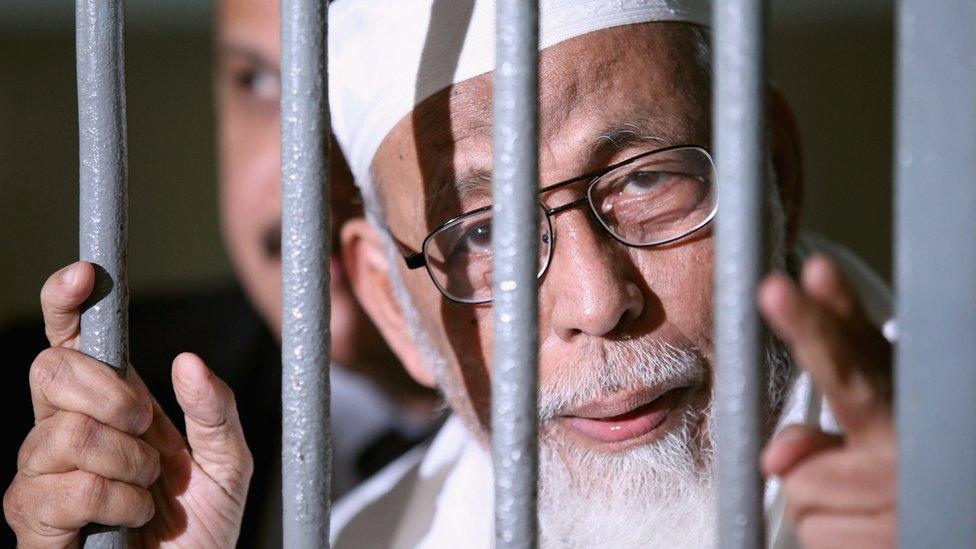Indonesia attacks: How Islamic State is galvanising support
- Published
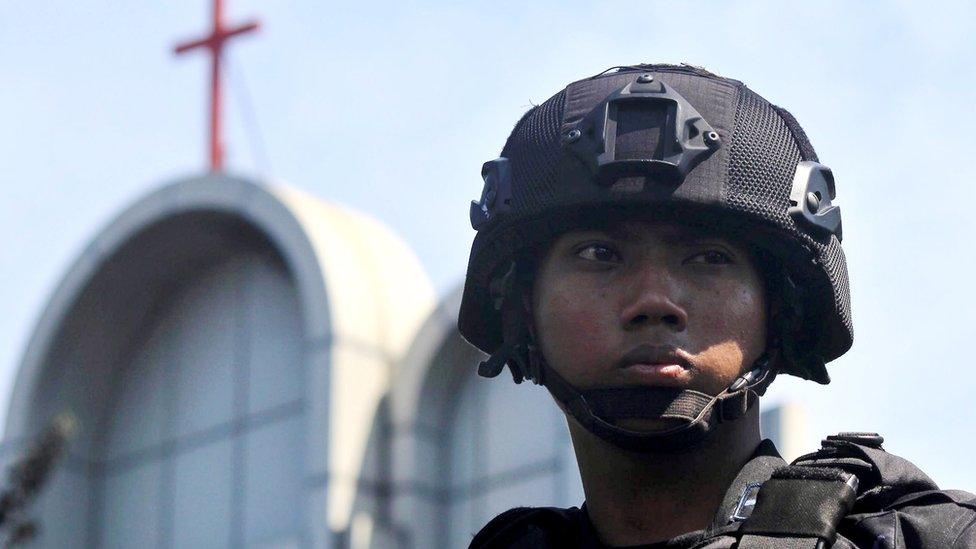
The latest attack on three churches in Surabaya is the deadliest in Indonesia since 2005
Indonesia, the world's largest Muslim-majority country, is among several nations in South East Asia that have suffered attacks in recent years by groups said to be linked to so-called Islamic State (IS).
The country, along with Malaysia and Singapore, warned back in 2015 that it was a question of when, rather than if, attacks linked to the group would occur in the region.
Then, in January 2016, a series of explosions and shootings in the heart of the Indonesian capital, Jakarta, killed four civilians and four attackers. It was the first attack in the country to be linked to IS.
The Jakarta attackers were later said to be part of the Indonesian-based Jemaah Ansharut Daulah (JAD) militant group, which had previously pledged allegiance to IS.
Since then, IS has continued to prove a draw for would-be jihadists across South East Asia.
How does IS influence the region?
IS stepped up its propaganda efforts in South East Asia following the Jakarta attack. The group used Indonesians in its videos to threaten governments and police and to urge supporters to carry out further attacks.
In 2017, Indonesia's military chief General Gatot Nurmantyo said that IS had spread to almost every province of the country.
The current generation of radicals are either newcomers who got their indoctrination from the internet and jihadist sites, or followers of the old radical movements but with few ties with the older generation.
Experts suggest that having viewed their predecessors as too timid, they later decided to split into new small groups, effectively going under the radar of the police.
Up to 30 Indonesian groups are known to have pledged allegiance to IS with some previously voicing ambitions to establish an official IS province in South East Asia.
Hundreds of Indonesians are also believed to have left the country to fight with the group in Syria and Iraq.
While many top militant leaders have been either killed or captured, IS-inspired cells exist and are a continuing threat, influenced by leaders both at home and abroad.
Aman Abdurrahman, leader of the JAD, is believed to command significant influence among jihadis in Indonesia, despite being detained in the country for the past 12 years.
He is currently on trial for inciting followers to commit acts of terrorism while behind bars at a detention centre which has been described by analysts as a breeding ground for pro-IS militants.
How has Indonesia responded?
Following Indonesia's worst-ever attack in 2002 - when 202 people were killed by al-Qaeda-linked militants in two bombings outside a bar and nightclub on Bali - authorities launched a crack-down on extremist groups.
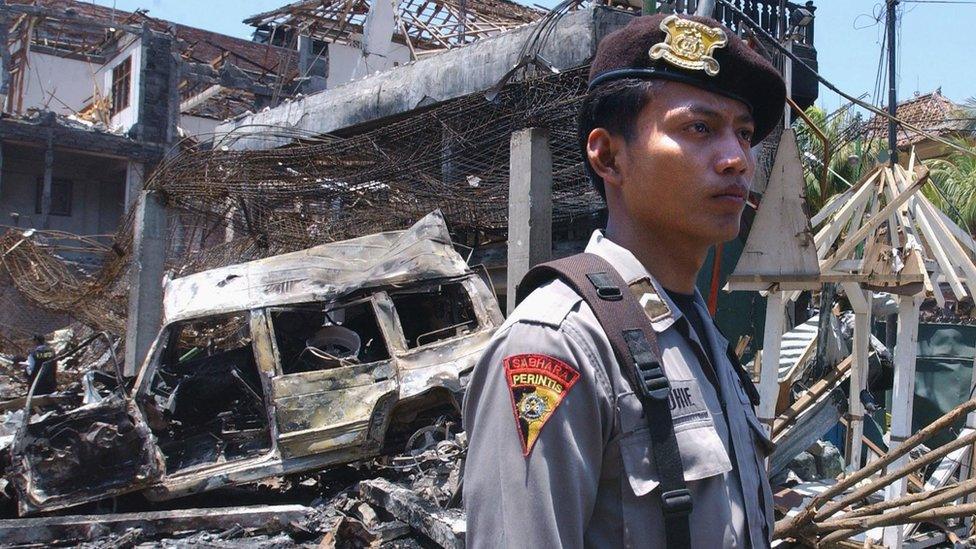
A bomb blast that targeted a nightclub on the island of Bali in 2002 killed more than 200 people
This involved a combination of arrests and targeted killings alongside a deradicalisation programme that focused on altering the mindsets of Indonesians and providing alternative incomes for some released militants.
The Indonesian authorities imprisoned some 800 militants and killed more than 100 since the Bali bombings. But it has not had a great amount of success reforming them.
As militants - some with significant battlefield experience - continue to be released from prison, they may bolster the current ranks of jihadists.
Meanwhile police are said to have prevented a number of attacks through their surveillance of known radical personnel.
What attacks have taken place in Indonesia?
The latest attack, in which at least 11 people were killed in explosions at three churches in Indonesia's second-largest city Surabaya, is the deadliest since 2005, when suicide bombings on Bali killed more than 20 people.
But Indonesia has suffered a number of deadly incidents linked to Islamist militancy over the years:
2002 (October): A bomb attack on the Kuta Beach nightclub district on Bali, external kills 202 people, most of them tourists
2003 (August): Fourteen people are killed when a car bomb explodes outside the Marriott Hotel in Jakarta, external
2004 (September): Another car bomb attack outside the Australian embassy in Jakarta, external kills nine and injures more than 180
2005 (October): Three suicide bombings on Bali kill 23 people, external, including the bombers
2009 (July): Twin suicide bomb attacks on the Marriott and Ritz-Carlton hotels in Jakarta kill nine people, external and injure many more
2016 (January): A bomb and gun attack in the centre of Jakarta kills two civilians and five attackers. IS claimed to be behind the attack
2017 (May): A suicide bomb attack in Jakarta kills at least three police officers and injures 10 people
2018 (February): Several people are injured in a sword attack at a church in Sleman, Yogyakarta
2018 (May): Five police officers are killed at a high security prison in clashes with Islamist militant prisoners
- Published13 May 2018
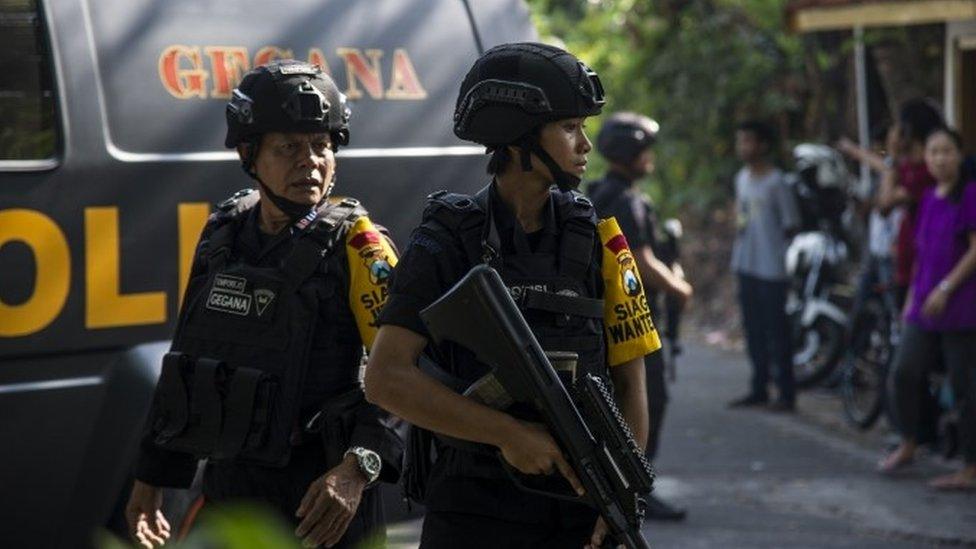
- Published14 January 2016
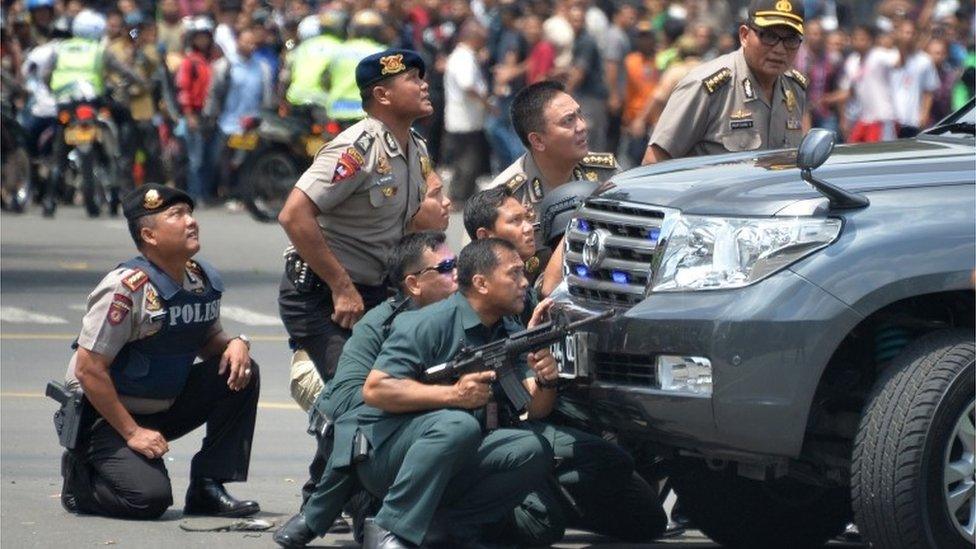
- Published20 July 2016
